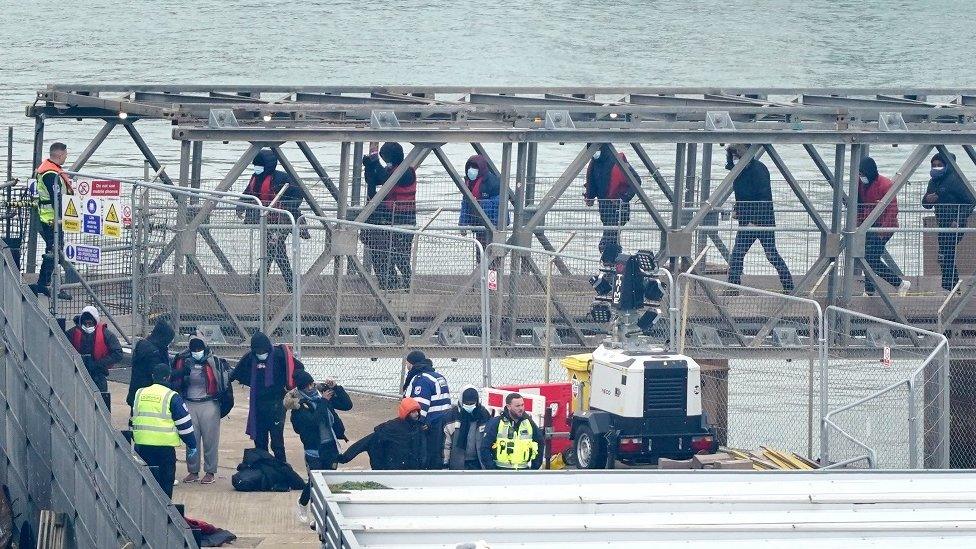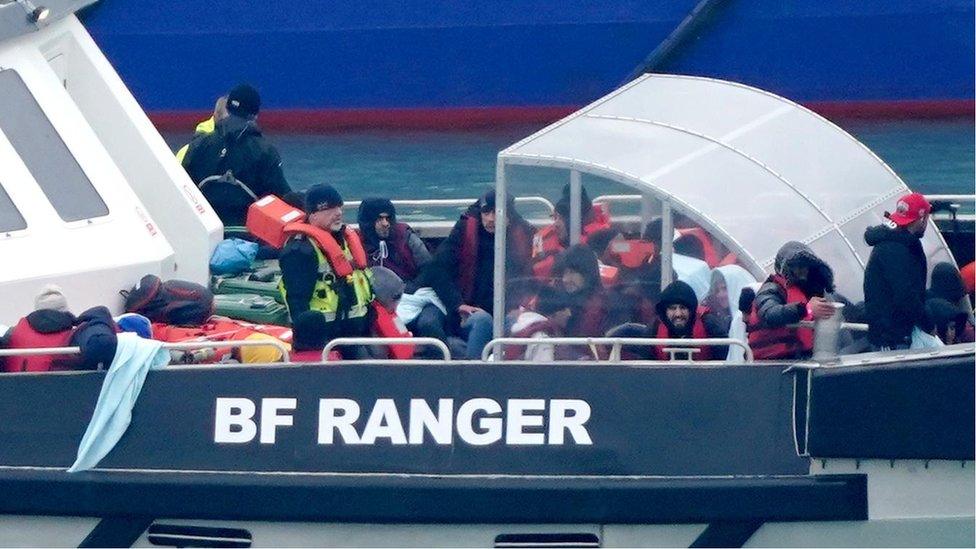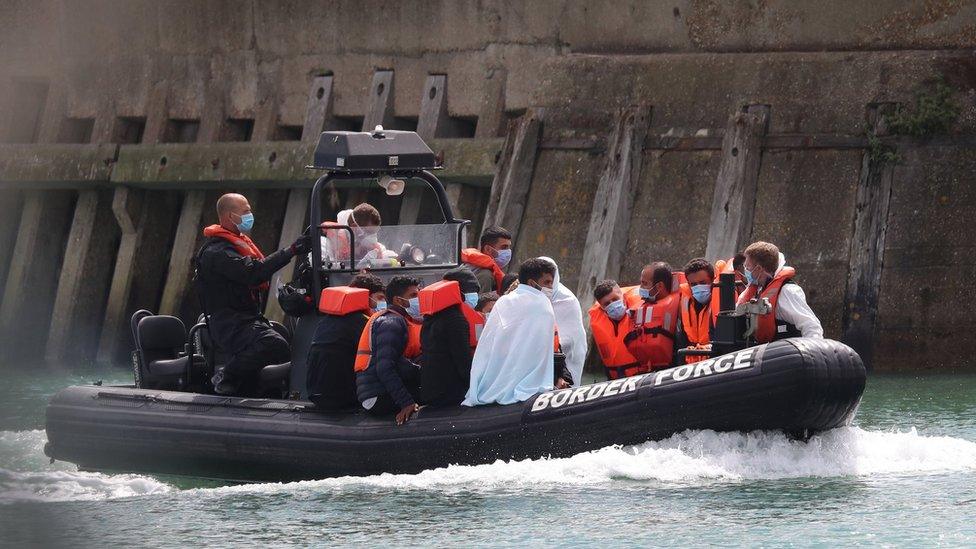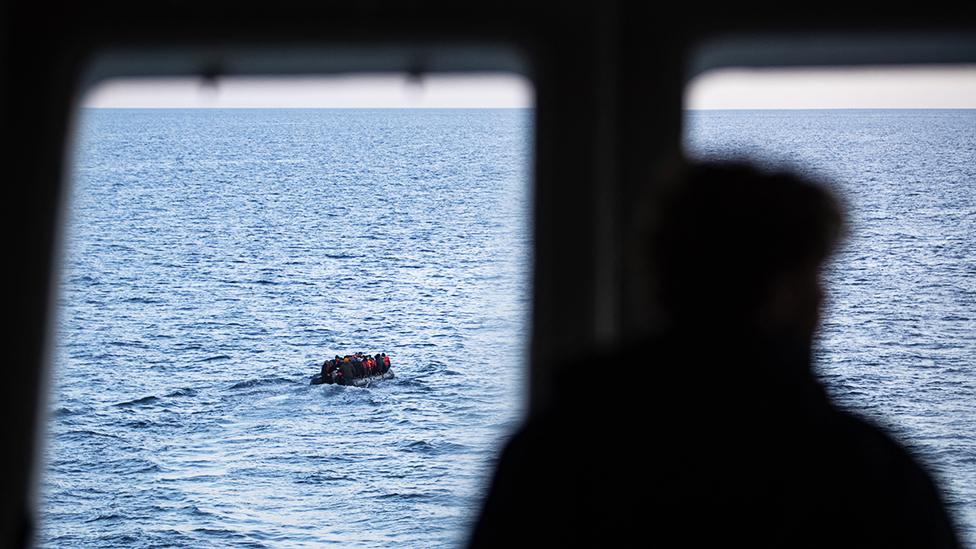Small boats: Sunak to outline plan to stop migrant crossings
- Published

A new law set to go before Parliament later will introduce new measures aimed at removing migrants entering the UK on small boats.
The Illegal Migration Bill is set to prevent those arriving illegally from claiming asylum, and will block them from returning or seeking citizenship.
Prime Minister Rishi Sunak said it was "fair for those at home and those who have a legitimate claim to asylum".
Labour leader Sir Keir Starmer has described the plans as "unworkable".
Home Secretary Suella Braverman said the bill would push "the boundaries of international law" without breaking it - telling the Express, external the measures were needed to "solve this crisis".
The government believes the issue of migrant crossings matters to voters and will be key at the next election, and ministers are prepared to test legal limits to address it.
The PM has made tackling it one of the central pledges of his premiership.
There are also clear political messages being raised, with Ms Braverman accusing Labour of "betraying hard working Brits" by not backing the plans.
More than 45,000 people entered the UK via Channel crossings last year, up from around 300 in 2018.
Under the proposals, the home secretary would be placed under a "duty to remove" those arriving illegally in the UK.
This would take precedence in law over someone's right to claim asylum - although there would be exemptions for the under-18s and those with serious medical conditions.
While the bill would not become law for several months it would apply retrospectively, meaning anyone arriving in the UK illegally from Tuesday would be at risk of deportation.
The new laws are expected to strain the UK's commitment to the European Convention on Human Rights and the UN's Refugee Convention - which currently give rights to asylum seekers arriving in the UK.
Reports suggest the legislation will come with an unusual legal warning.
Every new bill must include an assurance to MPs that it complies with the Human Rights Act, but it is reported Tuesday's package may instead come with a "Section 19b" statement.
This is a formal alert to MPs that the proposals may be incompatible with human rights and therefore could fail before the courts.
There have only ever been a handful of these warnings - and they are only added when the government's top internal lawyers have warned ministers that an idea could be legally unworkable.
The government is expected to face a number of serious practical obstacles in making any of the proposed measures a reality. While it has a majority in the Commons, parts of the plan could be blocked in the Lords.
And if it becomes law, there will be a slew of challenges to judges.
Under the new measures, the home secretary would have to detain and remove those arriving illegally to Rwanda or a "safe" third country "as soon as reasonably practicable" - no matter where they come from.
The government already has a policy in place aimed at deporting some asylum seekers to Rwanda - but so far no one has been sent there and any plans to do so are currently being held up by legal challenges.
In December the High Court ruled the policy was legal, and did not breach the UN's Refugee Convention.
A refugee is a person who has been forced to leave their country in order to escape war, persecution, or natural disaster, where as a migrant refers more broadly to anyone who moves from one place to another.
The Times reports two former RAF bases in Lincolnshire and Essex would be used to house those detained before their removal.
Meanwhile, the Immigration Services Union representing border staff called the plans "quite confusing", as they did not seem possible without the Rwanda policy functioning.
The union's Lucy Moreton also suggested on BBC Radio 4's Today programme that smuggling gangs would tell people "quick, cross now before anything changes", risking an increase in the number of crossings.
'Enough is enough'
In an opinion piece for the Sun, Mr Sunak said the UK had a "proud history of welcoming those most in need" and the new measures were "fair for those at home and those who have a legitimate claim to asylum".
"Those arriving on small boats aren't directly fleeing a war-torn country or facing an imminent threat to life," he said.
"Instead, they have travelled through safe, European countries before crossing the Channel. The fact that they can do so is unfair on those who come here legally and enough is enough."
Ms Braverman said she and the prime minister had been "working tirelessly" to make sure the bill worked and it was about "fairness" for the "tens of thousands of migrants" who were "not jumping the queue".
The prime minister will meet France's President Emmanuel Macron on Friday to discuss further cooperation that will be required to reduce boat crossings.


Ministers expect this bill to cause a row.
It is perhaps the first row they have consciously picked since Rishi Sunak became prime minister, rather than walked into by accident.
It is, remember, one of the PM's five key promises. Three relate to the economy, one to the NHS and the final one is to "stop the boats".
Quite the challenge.
It is the "last chance for the Conservatives to sort this," one insider acknowledges - and Tory MPs say it really matters to plenty of the voters they want to keep onside.

Labour leader Sir Keir Starmer said the only way to deal with the issue of crossings was "to break the criminal gangs who are driving this".
He called for more resources to set up a specialist unit within the National Crime Agency and speedier processing of existing asylum applications.
Numerous critics have also argued that, aside from schemes for people from specific countries such as Afghanistan and Ukraine, there are currently no safe and legal routes for most people to seek asylum in the UK.
The Liberal Democrats called the measures "immoral, ineffective and incredibly costly for taxpayers while doing nothing to stop small boat crossings".
The Refugee Council said it would "shatter the UK's long-standing commitment under the UN Convention to give people a fair hearing regardless of the path they have taken to reach our shores".
And Freedom from Torture, a charity which provides therapy to asylum seekers, described the measures as "vindictive and dysfunctional".
Related topics
- Published6 March 2023

- Published4 January 2023

- Published7 March 2023
